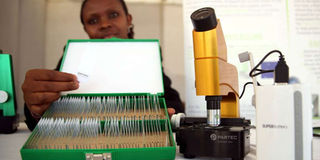Let’s leverage innovations to make healthcare affordable

A health specialist displays a CyScope, a battery-powered microscope innovation. It is a fully equipped with ready-to-use malaria test slides that contain dried-in reagents. FILE | NATION
Last month, the government allocated Sh44.6 billion to healthcare, with most of it going to maternal health, health insurance, increasing the number of medical facilities and provision of specialised medical equipment.
While these are important, there is need to address affordability of healthcare especially for low-income communities. How do we make quality services available and affordable?
The answer is innovative health solutions, which can see to it that everyone has access to quality and affordable healthcare when they need it.
Just after the national budget was read, Ugandan Brian Gitta won the Africa Prize for Engineering Innovation.
He is the brainchild of Matibabu, a device that tests for malaria without drawing blood.
The low-cost device is clipped onto a patient’s finger, and uses a beam of light and magnets (instead of the dreaded finger prick) to look for changes in blood associated with malaria infection. The result is a bloodless test that does not require an expert and faster results, meaning that patients can get faster diagnosis that is more affordable (no need for laboratories with experts and reagents). This in turn means that deaths and the spread of malaria can be prevented.
Another innovation of note is the MamaOpe, also from Uganda.
CHANGING TIDE
It is a smart jacket that measures pneumonia symptoms in children, and distinguishes them from similar symptoms of other diseases, making for more accurate diagnosis.
There are also initiatives like Clinic Pesa and Afya Poa which provide easy access to funds for emergency medical bills. These solutions ensure that patients can pay for quality healthcare services without suffering financial hardship.
By providing critical healthcare services to low-income earners, solutions such as Matibabu, MamaOpe, Clinic Pesa and Afya Poa drive health for all, while helping solve Africa’s toughest health challenges.
While health innovations have long been overlooked by key players, the tide is turning.
The investment ecosystem is becoming more aware of the benefits of investing in healthcare systems and products, and for good reason. Health start-ups help solve pertinent health problems, create jobs and increase productivity of workers, and this translates to better economic value (higher GDP) for the country.
A renewed outlook on how to go about achieving universal health coverage is therefore important.
Policies should focus on people, especially those in low-resource settings and how to rope them in as key players, rather than as just statistics.
Providing and supporting practical and affordable solutions that speak to patient needs will boost inclusion and translate to measurable impact on the healthcare system.
Ms Akelo is the Communications Assistant at Villgro Kenya, a business incubator for enterprises in the health and life sciences


